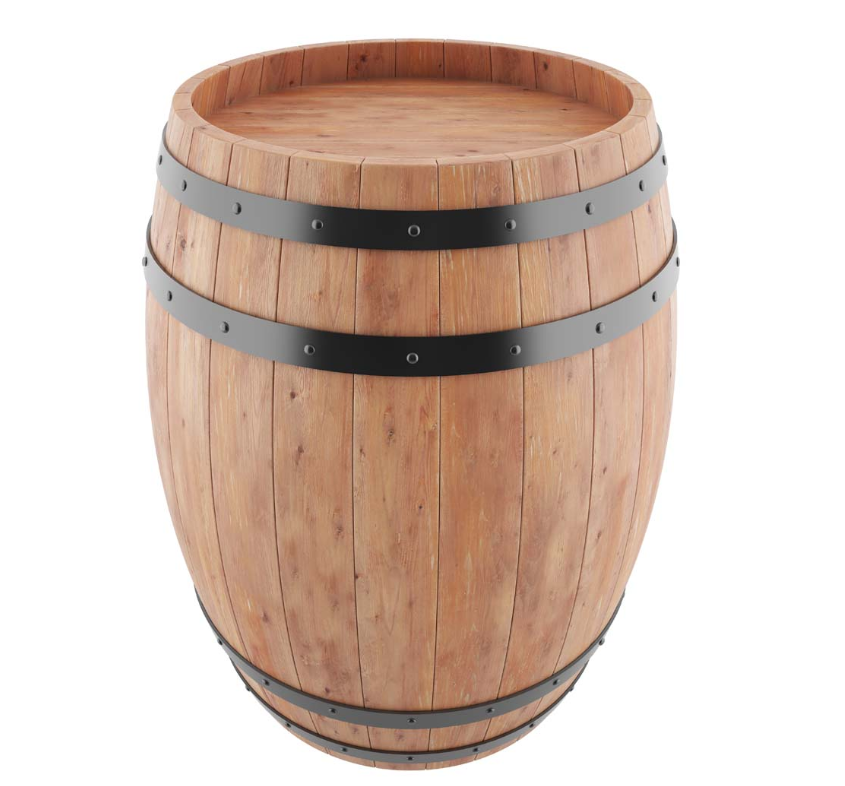(单词翻译:单击)
听力文本
Now, Words and Their Stories, a program from VOA Learning English.
Today we talk about a problem we have all faced. It is when you have to make a decision, but the choices you have are not very appealing. In fact, some of those choices are really bad.
We have all had to choose from leftovers that no one else wanted. In other words, we had to scrape the bottom of the barrel.
As you probably know, a barrel is a round, usually wooden container. It has curved sides and flat ends.

Barrels are often found on farms. They are usually strong and good for holding tools. Some makers of alcoholic drinks, such as wine and bourbon, let their products age in oak barrels. Some people say the right wood gives the final product a smoky quality.
Hundreds of years ago, barrels had another -- much more important -- purpose. This was long before the United States became independent. Before then, people often stored preserved food in barrels and then put the barrels in cold rooms. This would keep the food from going bad.
A professor at the University of Connecticut studied this custom. D. M. Kinsman's report is called Meat Preparation and Preservation in Colonial America.
Kinsman writes that many colonial families got through cold winters by keeping their meat supplies in a barrel filled with salted water, or brine. Then they kept the barrel in a cold room.
He added that the salted meat "barrel ... and the icy chilliness of winter cold rooms saw many a northern colonial family through what might otherwise have been a disastrous year."
Over time as people ate from the barrel, the food stored would slowly disappear. Finally, when supplies were nearly gone, hungry people had to take whatever they could find from the bottom of the barrel. This was probably the worst food available.
And this is where the expression "to scrape the bottom of the barrel" comes from.
You can also simply say the "bottom of the barrel." When you have used up all of the good choices, you have hit the bottom of the barrel. So, hitting the bottom of the barrel means you will probably have to settle for a less desirable option.
You are choosing something simply as a last resort. When nothing else is available or works, we simply choose the last resort.
These are all great ways to describe times when your choices are less than perfect.
Now, let's hear how to use these expressions in a conversation.
Two friends are on vacation. They have gone to a quiet seaside town for a week. However, the clouds are moving in. Let's listen as they discuss their options for some quiet reading time indoors. You can also learn some useful beach terms!
Too bad it's raining.
Well, it's a good thing we spent all day yesterday enjoying the sun and swimming in the ocean.
You're right. I think I'll sit back with a good book.
Good idea. Hey, there are some books on this bookcase.
Perfect. I love how people on vacation leave behind their beach reads. Can you read some of the titles?
Let's see. Would you rather read Love at Low Tide or Sandcastle Romance?
I'm not really in the mood for a romance novel. What else is there?
Hmm. There's some self-help books: Surviving a Coast-to-Coast Relationship and When it Comes to Love Are You Lost at Sea?
No, thanks.
Romance on the Waves?
Are you serious?!
Okay. As a last resort, you could read The Sexiest Sunburn.
Who thinks of these titles?! There has to be something else other romance novels.
Nope. We are really scraping the bottom of the literary barrel with these choices. We may have to settle on reading some take-out menus.
Oh, I give up! We're on vacation. Hand me Romance on the Waves. If we've reached the bottom of the barrel, I might as well enjoy it! What about you?
I wasn't kidding about reading the take-menus. I'll find us something good for dinner.
And that's Words and Their Stories.
When you listen to our programs, we sure hope you don't feel as if you're scraping the bottom of the barrel.
I'm Anna Matteo.
Do you have a similar expression that means "scraping the bottom of the barrel" in your language? Let us know ... in the Comments Section!
重点解析
1.settle for 选择;(尤指)勉强接受,将就
He refused to settle for anything that was second best.
他拒绝退而求其次。
2.as a last resort 最后的办法;最终手段
As a last resort, I asked for the possibility of a tent.
最后万不得已,我问有没有帐篷可以用。
3.sit back 轻松地坐;不插手;袖手旁观
They didn't have to do anything except sit back and enjoy life.
他们只需置身事外,享受生活。
4.leave behind 永久离开;抛下;留下;余留;把…抛在后面;超过
We're going to be left behind by the rest of the world
我们将被全世界甩在后面。
参考译文
现在是VOA学英语《词汇掌故》节目时间。
今天我们来谈论一个我们都会面对的问题。这就是当你必须做一个决定的时候,可是你所拥有的选择都不太吸引人。实际上,其中一些选择还很糟糕。
我们都不得不从别人不想选的选择中去做选择。换句话说,我们必须退而求其次(scrape the bottom of the barrel)。
你也许知道,“barrel(桶)”是一个圆圆的,通常是木制容器。它的边是弯曲的,两头是扁平的。
农场里经常会有这种圆桶。它们通常很坚固且很适用于夹持工具。一些酒精饮料的制造商,如葡萄酒和波旁威士忌,这些制造商会让他们的产品在橡木桶中保存。一些人说使用正确的木材才能使使最终的成品具有绝佳的品质。
很多年前,木桶还有一个更重要的用途。这是早在美国独立之前。在那个时候,人们经常将腌制的食品放在木桶里,然后把木桶放在冷室里。这样做可以防止食品变质。
康涅狄格大学的一位教授研究过这项习俗。D·M.金斯曼的报告题为《美国殖民地时期的肉类制备和存储》。
金斯曼写道,许多殖民地家庭靠将肉存储在装满咸水或者盐水的木桶里来挨过冬天。然后,他们将木桶放在冷室里。
他还补充说腌肉“木桶……以及冬天冷室里的冰冻般的寒冷见证了许多北方殖民地家庭度过了原本可能是灾难性的一年。”
随着人们慢慢吃掉木桶中的食物,储存的食物也会慢慢没有了。最后,当存储几近没有的时候,饥饿的人们不得不从桶底取出他们能发现的任何东西。这可能是最糟糕的食物。
这也是表达“scrape the bottom of the barrel(字面意思是‘刮木桶底’)”的由来。
你也可以简说为“bottom of the barrel”。当你用光了所有好的选择,你就会碰到桶底。因此,碰到桶底意味着你也许不得不将就(settle for)一个不太理想的选择。
选择某事物仅仅是为了作为最后的手段(as a last resort)。当没有其他可供选择或者有用的办法时,我们就会选择这个最后手段。
这些都是形容当你的选择不那么完美的时候的很好的表达方式。
现在,让我们在对话中来听下这些表达的使用方法。
两个朋友在度假。他们去了一个平静的海滨城镇度假一周。然而,乌云开始堆积。让我们来听听他们就在室内静静阅读时的选择的讨论时的对话。你也可以学习一些有用的沙滩表达!
太糟糕了,下雨了。
嗯,我们昨天整天都在享受阳光以及在海里游泳,真是一件美好的事情。
你说得对。我想读读好书。
好主意。嘿,这个书架上有一些书。
太好了。我喜欢人们度假时抛下他们的沙滩去阅读。你能念一些书名吗?
让我来看看。你是愿意读《低潮时期的爱情》还是《沙堡浪漫》?
我真不太想看浪漫小说。那儿还有什么别的书?
嗯。有一些自助书籍:《怎么维持异地恋》和《当爱情来临时,你会感到迷惘吗?》?
不了,谢谢。
《海浪中的浪漫》?
你是说真的吗?
好吧。最后一个选择了,你可以读《最性感的晒伤》。
谁想的这些书名?!除了浪漫小说,肯定还有一些别的书。
没有了。我们是真得没有其他选择了。我们也许不得不将就读一些外卖菜单了。
哦,我放弃了!我们是在度假。给我《海浪中的浪漫》。如果我们已经别无选择了,我只好喜欢这本书了!你呢?
我要看外卖菜单,我不是在开玩笑。我要找找看我们的晚餐吃什么好。
这就是本期的《词汇掌故》。
当你收听我们的节目时,我们当然希望你不是感觉你是别无选择才来收听我们的节目。
我是安娜·马特奥。
你的语言里有类似表示“别无选择(scrape the bottom of the barrel)”的表达吗?请在评论区留言告诉我们!


